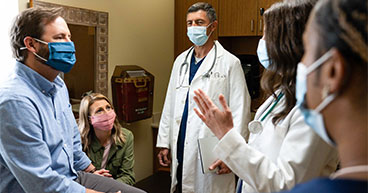
When you’re at the pharmacy getting a prescription, you’re probably not thinking about the many hours of research—the testing successes and failures—that went into developing that medicine before it made its way to you. It may take more than 10 years and cost millions of dollars to turn an idea into a drug ready for approval by the U.S. Food and Drug Administration (FDA).
Clinical trials —those that involve humans—are a critical part of the process.
“These modern leading-edge drugs that we have available for patients had to start as a clinical trial,” says Edward Kim, MD, MBA, Physician-in-Chief, City of Hope Orange County, Construction Industries Alliance City of Hope Orange County Physician-in-Chief Chair, Vice Physician-in-Chief, City of Hope National Medical Center and System Director, Clinical Trials for City of Hope®.
However, people eligible to participate in such trials are often reluctant to do so,” Dr. Kim says. They may also be concerned that the test drug isn’t guaranteed to be safe or that it may have bad side effects.
Clinical trials, particularly those for cancer treatments, may offer options to patients who have exhausted all other avenues of treatment. Trials may also give some patients access to treatments that may otherwise be unavailable and potentially more effective than those already approved by the FDA.
“Clinical trials help us define our next standard of care,” Dr. Kim says. “In many tumor types where there aren't a lot of standard-of-care options available. Trials give us the opportunity to try and fight the cancer with new treatments.”
A June study in the Journal of Clinical Oncology shows that 7.1 percent of cancer patients have enrolled in some form of clinical cancer treatment study. While low, that participation rate was higher than what had been reported in earlier studies, which had pegged the rate at less than 5 percent.
Dr. Kim says efforts to make participation in clinical trials easier received a boost during the COVID-19 pandemic, as interactions between patients and doctors were curtailed.
“We were forced to find efficiencies in our whole clinical trial process,” Dr. Kim says. “We also learned that you don't have to see the patient every time in a clinical study. It depends on the type of drug and the side effects. Telehealth and electronic informed consents became more popular.”
In this article, we will examine:
- What is a clinical trial?
- Clinical trial phases
- Diversity in clinical trials
- Why are clinical trials important?
- Are clinical trials safe?
- How to find a clinical trial for cancer
If you’ve been diagnosed with cancer and would like to get a second opinion on your diagnosis or screening options, call us or chat online with a member of our team.
What is a clinical trial?
Clinical trials show researchers how new drugs work when given to humans. They answer specific questions about vaccines, new therapies or novel ways of using known treatments.
The trials help researchers determine the safety, dosages and effectiveness of the drugs and to identify potential interactions with food and other medicines. Even when a trial does not lead to FDA approval, it still may provide information that will point researchers in a better direction.
Sometimes, a clinical trial may involve an already approved cancer drug that is being evaluated for its effectiveness treating a different cancer, or a non-cancer drug that is now being assessed for cancer therapy.
Before a cancer drug is tested on humans, it is typically tested on cancer cells grown in a laboratory and, later, on cancer in living animals to better understand potential safety concerns. The results of these pre-clinical trials must support the premise that the drug is effective and safe before it is allowed to be used in trials involving people.
Participants volunteer to be part of a trial, which is performed under FDA-approved guidelines, and are monitored closely.
Clinical trial phases
During human testing, drugs undergo different types of clinical trials. As described by the American Cancer Society (ACS), the trials are grouped in phases, as listed below.
Phase 0: These trials take a quick look at how a drug performs in humans, usually using only a few doses in a few participants. They may quickly eliminate drugs that don’t appear to perform well. Because the dose is limited, there’s less risk to participants and also less chance they will see any sustained benefits. This phase is almost purely research oriented.
Phase 1: These trials assess the safety of a new drug, evaluate how the body handles the drug, establish safe dosage ranges and check for any negative side effects. A trial may include 20 to 80 participants. This phase carries the most potential risk, the ACS says, so is usually carried out in major cancer centers.
Phase 2: These trials look more closely at a drug’s effectiveness in treating a cancer. Does a tumor shrink in size or disappear? Does the cancer stop growing? Does the therapy lengthen the period before the cancer returns? This phase typically involves 100 to 300 participants, usually receiving similar doses.
Phase 3: These trials examine if a new drug is better at treating a cancer than what’s already available. Trials are often randomized, with some participants receiving the new drug and others getting the already-approved standard-of-care treatment for their cancer. The number of participants may be in the hundreds or thousands and they may be followed for several years. The trials may be double-blind studies, where neither the patient nor the doctor know if the patient is getting the new drug or the current standard-of-care medicine.
Phase 4: These trials take place only after a drug receives FDA approval and is widely marketed. The trials gather information from an even larger group of people to assess a drug’s long-term effectiveness and how it affects quality of life.
Some cancer patients may worry they won’t get the real drug if they participate in a trial but will receive a placebo that will have no effect on their cancer. That’s typically not how cancer treatment trials are conducted.
“We've moved away from a lot of placebo-type trials,” Dr. Kim says. “What you'll see more often is that patients will be randomized to a standard-of-care arm versus an experimental arm, especially in the Phase 3 setting.” That means if you don’t get the new drug, at least you’re receiving the best FDA-approved treatment available.
The ACS says placebos are never used in Phase 1 or Phase 2 trials and may only be used in Phase 3 trials if there’s no approved treatment available.

Dr. Edward Kim
Diversity in clinical trials
Clinical trial managers have struggled to achieve greater diversity among study participants, with Blacks, Hispanics, women and older individuals often underrepresented—even in trials for treatments of cancers they may be more likely to get.
The National Institutes of Health (NIH) now requires that all clinical research it funds “must address plans for the inclusion of women and minorities within the application or proposal.” Dr. Kim says, “It's the right thing to do. It forces investigators to find ways to diversify their patient population, and I think that's very important.”
A study presented in Fall 2023 at an American Association of Cancer Research (AACR) conference shows a greater proportion of participants in early-phase clinical trials sponsored by the National Cancer Institute (NCI) in 2020-2022 were from underserved populations compared to similar trials in 2000-2003. The study’s look at participation rates found:
- An increase in older participants.
- Patients aged 75 to 84 went from 5.9 percent to 12.3 percent.
- Those aged 65 to 74 increased from 24.2 percent to 32.9 percent.
- A decrease in white participants.
- Non-Hispanic whites dropped from 83.7 percent to 72.9 percent
- An increase in diverse populations.
- Hispanic/Latino participation rose from 4.2 percent to 6.9 percent.
- Asian/Pacific Islanders went form 2.5 percent to 5.4 percent.
- Non-Hispanic Blacks increased from 6.3 percent to 7.1 percent.
- Those with unknown or unspecified race or ethnicity went from 3.3 percent to 7.6 percent.
Still, the 7.1 percent Black participation is below the 13 percent proportion of Blacks in the United States overall, just as the 6.9 percent participation rate for Hispanic/Latino individuals is under their 16 percent proportion of the population.
In its 2024 Cancer Disparities Progress Report, the AACR said, “certain segments of the U.S. population continue to be severely underrepresented in clinical research.” The results of less-than-diverse trials may still be valid, but information about how a drug may affect specific groups will not be as beneficial to ensuring “that newly approved anticancer agents can be safely used in the real-world patient population for whom these treatments are ultimately intended.”
Why are clinical trials important?
Without clinical trials, there would be no way of knowing if a drug is safe to administer before it is made available to patients, or what its side effects may be. The trials help advance scientific knowledge for treating diseases while minimizing potential safety risks to participants.
Patients who have received all the approved treatments for their cancer without success may benefit from a new drug being studied. “If you don't have very good standard-of-care options, there's a chance that the clinical trial might be better for you,” Dr. Kim says.
“The clinical trials give the patient a unique opportunity to have treatment for their cancers with potentially future standards of care,” he says.
Are clinical trials safe?
Safety is at the center of every clinical trial, Dr. Kim says.
“We try to make it as safe as possible, but even receiving standard-of-care therapy for cancer isn’t always safe,” Dr. Kim says. “There are side effects that can occur. We monitor patients very closely."
If a clinical trial involves a drug that’s being used in humans for the first time, the doctors administering it are hyper aware, he says. If it’s a drug that’s already being used for treatment of other conditions or cancers, then doctors may already have a good idea of the potential side effects.
How to find a clinical trial for cancer
Dr. Kim encourages people with cancer to consider participating in clinical trials and to ask their doctors about those that may be available for their particular cancer. Individuals may also come to cancer centers like City of Hope where trained teams of professionals deal extensively with clinical trials and can provide comprehensive information and advice.
“You have to be your own champion regarding some of this. Places that don't offer clinical trials are not going to want you to leave for a clinical trial. They want to treat you with standard-of-care therapy,” Dr. Kim says. “I think patients have to be their own champions or have family members or friends who are going to be their champions to help them find other opportunities.”
City of Hope is a leader in clinical trials and has a national network of cancer centers providing them.
“At City of Hope, we're ensuring people in the communities we serve have access to trials. Some of these locations haven’t had that access before,” Dr. Kim says. “We will be opening clinical trials in Chicago, Atlanta and the Phoenix regions, bringing our leading-edge types of therapies to these populations.”
Across its system of care, City of Hope has more than 850 ongoing clinical trials involving thousands of participants.
“We have trials available at multiple locations across this national network,” Dr. Kim says. “We believe that all of our patients deserve access to clinical trials and we are working hard to make that possible.”
If you’ve been diagnosed with cancer and would like to get a second opinion on your diagnosis or screening options, call us or chat online with a member of our team.



